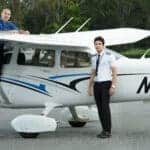How to Prepare for Your Commercial Pilot Exams – The #1 Ultimate Guide

What are exams, really? At their core, they’re a way to show that you’ve truly acquired the knowledge and expertise you’ve studied or trained for. This is especially true in aviation, where exams like the Commercial Pilot Exams are designed to prove that a private pilot is ready and fit to take on the challenges of a commercial pilot.
Passing the Commercial Pilot Exams is no small feat. They test not only your understanding of complex aviation concepts but also your ability to apply that knowledge in real-world flying scenarios. It’s a rigorous process, but one that ensures you’re fully prepared to operate as a professional pilot.
In this article, we’ll guide you through the steps to prepare effectively for your Commercial Pilot Exams, from mastering the theory to excelling in the practical checkride. Whether you’re just starting your journey or fine-tuning your skills, this guide will help you prove you’re ready to take on the skies as a commercial pilot.
Understand the Structure of Commercial Pilot Exams
Before diving into preparation, it’s essential to understand what the Commercial Pilot Exams entail. These exams are divided into two main components, each designed to assess different aspects of your readiness to become a commercial pilot.
The written exam focuses on theoretical knowledge, covering subjects like aerodynamics, meteorology, navigation, and aviation regulations. This test ensures you have a solid understanding of the principles that govern flight and the rules that keep the skies safe.
The practical exam, often referred to as the checkride, is where you demonstrate your flying skills. During this test, an examiner will evaluate your ability to handle real-world scenarios, make sound decisions, and execute maneuvers with precision. It’s the ultimate test of your readiness to operate as a professional pilot.
These exams are overseen by regulatory body the DGCA (Directorate General of Civil Aviation) in India. Understanding their requirements and standards is crucial for success.
Create a Study Plan
Preparing for the Commercial Pilot Exams requires more than just hard work—it demands a well-structured study plan. Without a clear roadmap, it’s easy to feel overwhelmed by the sheer volume of material to cover.
Start by setting a realistic timeline based on your exam date. Break down the syllabus into manageable sections, allocating time for both theoretical study and practical flight practice. For example, you might dedicate mornings to reviewing aerodynamics and afternoons to practicing maneuvers in the air.
Here are some tips to create an effective study plan:
Set Clear Goals: Define what you need to achieve each week, whether it’s mastering a specific topic or completing a set of practice questions.
Use Reliable Resources: Invest in study guides, online courses, and practice tests to reinforce your learning.
Balance Theory and Practice: While the written exam is important, don’t neglect hands-on flight training. Both components are equally critical for success.
By following a structured plan, you’ll not only cover all the necessary material but also build the confidence needed to excel in your Commercial Pilot Exams.
Master the Theoretical Knowledge
The Commercial Pilot Exams in India require a thorough understanding of several key subjects, each of which plays a critical role in your development as a professional pilot. Mastering these topics isn’t just about passing the exam—it’s about equipping yourself with the knowledge to handle real-world challenges in the cockpit.
Here’s a detailed look at the key subjects and why they matter:
Aerodynamics and Aircraft Systems
Aerodynamics is the science of how air interacts with an aircraft, and understanding it is essential for safe and efficient flying. You’ll learn about lift, drag, thrust, and weight—the four forces that govern flight.
Additionally, studying aircraft systems (e.g., engines, hydraulics, and electrical systems) will help you troubleshoot issues and operate the aircraft confidently.
Why it matters: A strong grasp of aerodynamics ensures you can handle the aircraft in various conditions, while knowledge of systems helps you respond to emergencies effectively.
Meteorology and Weather Patterns
Weather is one of the most unpredictable factors in aviation. This subject covers cloud formations, wind patterns, turbulence, and how to interpret weather reports and forecasts. You’ll also learn about the impact of weather on flight performance and safety.
Why it matters: Understanding meteorology helps you make informed decisions, avoid hazardous conditions, and ensure the safety of your passengers and crew.
Navigation and Flight Planning
Navigation involves reading aeronautical charts, plotting routes, and using navigation aids like VOR and GPS. Flight planning includes calculating fuel requirements, understanding airspace classifications, and complying with ATC instructions.
Why it matters: Accurate navigation and flight planning are essential for staying on course, optimizing fuel efficiency, and adhering to air traffic regulations.
Air Regulations and Aviation Law
This subject covers DGCA regulations, air traffic control procedures, and aviation law. You’ll learn about pilot responsibilities, airspace rules, and the legal framework governing aviation in India.
Why it matters: Compliance with regulations ensures safe and lawful operations, while understanding aviation law protects you and your employer from legal issues.
Recommended Resources for Studying:
To master these topics, use the following resources:
- Official DGCA Manuals: These are the most authoritative sources for exam preparation.
- Online Courses and Video Tutorials: Platforms like YouTube, aviation forums, and e-learning websites offer detailed explanations and visual aids.
- Study Groups and Peer Discussions: Collaborating with fellow students can help clarify doubts and reinforce your understanding.
By diving deep into these subjects and understanding their real-world applications, you’ll not only ace the Commercial Pilot Exams but also build a strong foundation for your career as a professional pilot.
Practice with Mock Exams
Preparing for the Commercial Pilot Exams isn’t just about studying—it’s about practicing under exam-like conditions. This is where mock exams come in. Think of them as a dress rehearsal for the real thing. They simulate the actual exam environment, helping you get comfortable with the format, timing, and types of questions you’ll face.
Mock exams serve several important purposes. First, they familiarize you with the exam format, so there are no surprises on the big day. You’ll know exactly what to expect, from multiple-choice questions to scenario-based problems.
Second, they help you identify weak areas. By reviewing your performance, you can pinpoint topics that need more attention, whether it’s meteorology, navigation, or air regulations. Finally, mock exams build confidence. The more you practice, the more comfortable you’ll feel, reducing exam-day anxiety and helping you perform at your best.
To make the most of mock exams, use reliable resources such as:
- DGCA-Approved Practice Tests: These are tailored to the Indian exam format and syllabus.
- Online Platforms: Websites like Sheppard Air and Aviation Exam offer extensive question banks and practice tests.
- Flight School Resources: Many flight schools provide mock exams as part of their training programs.
Incorporating mock exams into your study routine is a proven way to boost your performance and ensure you’re fully prepared for the Commercial Pilot Exams.
Focus on Practical Flight Training
While acing the written exam is important, the Commercial Pilot Exams also test your ability to apply that knowledge in the air. Practical flight training is where you’ll develop the hands-on skills and confidence needed to operate as a professional pilot.
One of the key areas to focus on is mastering maneuvers. During your training, you’ll practice steep turns, stalls, slow flight, and emergency procedures. These exercises aren’t just about technical skill—they’re about learning how to control the aircraft in various conditions and respond effectively to unexpected situations.
Another critical aspect is improving decision-making and situational awareness. Flying isn’t just about following procedures; it’s about making smart, timely decisions. Practice assessing situations, prioritizing tasks, and staying aware of your surroundings. This skill is especially important during emergencies or challenging weather conditions.
You’ll also need to practice cross-country and night flying. Cross-country flights teach you how to plan and execute long-distance trips, while night flying prepares you for low-visibility conditions. Both are essential skills for a commercial pilot and are heavily tested during the practical exam.
Throughout your training, your certified flight instructor (CFI) will play a vital role. They’ll guide you through each step, provide feedback, and help you refine your skills. Don’t hesitate to ask questions or seek clarification—your CFI is there to ensure you’re fully prepared for the Commercial Pilot Exams.
By combining rigorous flight practice with focused training, you’ll not only pass the exams but also develop the confidence and competence needed for a successful career in aviation.
Commercial Pilot Exams: Prepare for the Checkride
The checkride is the final hurdle in your Commercial Pilot Exams, and it’s where you’ll demonstrate your skills and knowledge to an examiner. This exam has two main components: the oral exam and the flight test.
During the oral exam, the examiner will ask questions about aircraft systems, regulations, and procedures. This is your chance to show that you understand the theoretical aspects of flying and can apply them in real-world scenarios. Be prepared to explain how systems work, interpret regulations, and describe emergency procedures.
The flight test is where you’ll put your skills into action. You’ll be asked to perform maneuvers, handle simulated emergencies, and demonstrate your ability to make sound decisions under pressure. The examiner will evaluate your flying skills, situational awareness, and overall readiness to operate as a commercial pilot.
Here are some tips to help you succeed:
- Review the Practical Test Standards (PTS) or Airman Certification Standards (ACS): These documents outline exactly what’s expected during the checkride. Use them as a guide to ensure you’re fully prepared.
- Practice with a CFI: Simulate the checkride experience with your flight instructor. They can provide feedback and help you refine your skills.
- Stay Calm and Focused: On the day of the exam, take a deep breath and trust your training. Remember, the examiner isn’t looking for perfection—they’re looking for competence and confidence.
By preparing thoroughly and staying focused, you’ll be ready to ace the checkride and take the next step in your aviation career.
Stay Healthy and Manage Stress
Preparing for the Commercial Pilot Exams can be intense, but it’s important to remember that your physical and mental well-being play a crucial role in your success. After all, flying requires not just technical skill but also sharp focus and clear thinking.
Here are some tips to help you stay healthy and manage stress during your preparation:
- Maintain a Healthy Lifestyle: Regular exercise, a balanced diet, and adequate sleep are essential for keeping your mind and body in peak condition.
- Practice Relaxation Techniques: Deep breathing, meditation, or even a short walk can help reduce stress and improve focus.
- Take Breaks and Avoid Burnout: Studying and training are important, but so is rest. Schedule regular breaks to recharge and avoid overworking yourself.
Remember, the Commercial Pilot Exams are a marathon, not a sprint. By taking care of yourself and managing stress effectively, you’ll be better equipped to handle the challenges of the exams and perform at your best.
Final Tips for Exam Day
The day of your Commercial Pilot Exams is finally here, and it’s natural to feel a mix of excitement and nerves. To ensure everything goes smoothly, it’s important to be well-prepared and organized.
Here’s a checklist to help you stay on track:
Bring All Required Documents: Make sure you have your logbook, medical certificate, photo ID, and any other documents specified by the DGCA or your flight school. Double-check the requirements beforehand to avoid last-minute stress.
Arrive Early and Be Well-Rested: Plan to arrive at the exam location with plenty of time to spare. A good night’s sleep will help you stay alert and focused during the exam.
Stay Confident and Trust Your Preparation: You’ve put in the hard work, so trust yourself. Remember, the examiner wants to see that you’re competent and capable, not perfect.
On exam day, stay focused and treat the experience as a learning opportunity. Even if you make a mistake, stay calm and demonstrate your ability to handle challenges professionally.
Conclusion
Preparing for the Commercial Pilot Exams is a challenging but rewarding journey. By understanding the exam structure, creating a study plan, mastering theoretical knowledge, practicing with mock exams, and honing your flying skills, you’ll be well-equipped to succeed.
Remember, the key to success is discipline and commitment. Stay focused on your goals, take care of your physical and mental well-being, and trust in your preparation.
With the right mindset and preparation, you can ace your Commercial Pilot Exams and take the next step toward an exciting career in aviation. The skies are waiting—go out there and make your dream a reality!
Contact the Florida Flyers Flight Academy India Team today at +91 (0) 1171 816622 to learn more about the Private Pilot Ground School Course.



Table of Contents






